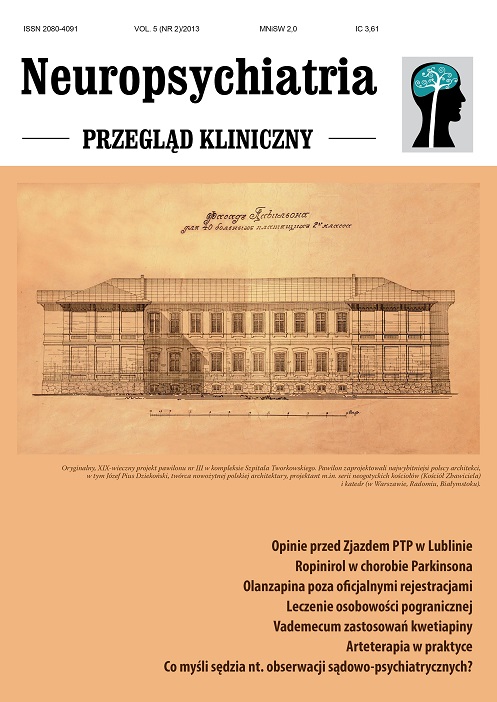Leczenie pogranicznych zaburzeń osobowości. Część II: psychoterapia Artykuł przeglądowy
##plugins.themes.bootstrap3.article.main##
Abstrakt
W ostatniej dekadzie w piśmiennictwie nt. leczenia zaburzeń pogranicznych szczególną skuteczność przypisuje się dwóm podejściom terapeutycznym: psychodynamicznemu i poznawczo- behawioralnemu. Metaanalizy Leichsenringa i Leibinga wskazują, że oba nurty terapeutyczne dają wyraźne efekty i poprawę funkcjonowania, jak również pozwalają na zmiany wzorców zachowań u osób z osobowością pograniczną. Należy jednak pamiętać, że techniki w nurcie psychodynamicznym niosą za sobą pewne zagrożenia dla niespójnych pacjentów pogranicznych. Eklektyczne podejście, w którym stosowane są różne techniki na różnych etapach leczenia, może przynieść maksymalne korzyści pacjentom, jak również ułatwiać pracę terapeutów. W przypadku osobowości pogranicznej również komfort pracy terapeuty jest niezwykle istotny, ponieważ silne reakcje przeciwprzeniesieniowe mogą spowodować szkody, zarówno dla leczonego, jak i leczącego.
##plugins.themes.bootstrap3.article.details##

Utwór dostępny jest na licencji Creative Commons Uznanie autorstwa – Użycie niekomercyjne – Bez utworów zależnych 4.0 Międzynarodowe.
Copyright: © Medical Education sp. z o.o. License allowing third parties to copy and redistribute the material in any medium or format and to remix, transform, and build upon the material, provided the original work is properly cited and states its license.
Address reprint requests to: Medical Education, Marcin Kuźma (marcin.kuzma@mededu.pl)
Bibliografia
2. Aleksandrowicz J. Nerwice: psychopatologia i psychoterapia. Państwowy Zakład Wydawnictw Lekarskich; Warszawa 1988: 122-123.
3. Levy KN. Psychotherapies and lasting change. American Journal of Psychiatry 2008; 165: 556-559.
4. Clarkin JF, Levy KN. Psychotherapy for patients with borderline personality disorder: focusing on the mechanisms of change. Journal of Clinical Psychology 2006; 62 (4): 405-410.
5. Preston J. Zintegrowana terapia krótkoterminowa. Gdańskie Wydawnictwo Psychologiczne; Gdańsk 2005: 247.
6. Goldstein EG. Zaburzenia z pogranicza. Gdańskie Wydawnictwo Psychologiczne; Gdańsk 2003: 120.
7. Mander G. Psychodynamiczna terapia krótkoterminowa. Gdańskie Wydawnictwo Psychologiczne; Gdańsk 2006: 19-22.
8. Bateman A, Fonagy P. Mentalization based treatment for borderline personality disorder. World Psychiatry 2010; 9: 11-15.
9. Levy KN, Wasserman RH, Scott LN, Yeomans FE. Empirical evidence for Transference-Focused Psychotherapy and Other Psychodynamic Psychotherapy for Borderline personality disorder. W: Levy RA, Ablon JS (red). Handbook of Evidence-Based Psychodynamic Psychotherapy. Current Clinical Psychiatry, cz. 1, Humana; Nowy Jork 2009: 93-119.
10. Levy KN, Yeomans FE, Denning F, Fertuck EA. Commentary: UL National Institute for Clinical Excellence guidelines for the treatment of borderline personality disorder. Personality and Mental Health 2010; 4: 54-58.
11. Goldstain EG. Zaburzenia z pogranicza. GWP; Gdańsk 2003.
12. Górska D. Uwarunkowania dysregulacji emocjonalnej u pacjentów z zaburzeniami osobowości pogranicznej. Bogucki Wydawnictwo Naukowe, 2006.
13. Kernberg OF, Selzer MA, Koenigsberg HA, Carr AC, Appelbaum AH. Psychodynamic Psychotherapy of Borderline Patients. Basic Books; New York 1989.
14. Clarkin JF, Foelsch PA, Levy KN, Hull JW, Delaney JC, Kernberg OF. The development of a psychodynamic treatment for patients with borderline personality disorder: a preliminary study of behavioral change. Journal of Personality Disorders 2001; 15 (6), 487-495.
15. Clarkin JF, Levy KN, Shiavi JM. Transference focused psychotherapy: development of a psychodynamic treatment for severe personality disorders. Clinical Neuroscience Reasearch. Elsevier B.V. 2005 (www.elsevier.com/locate/clires).
16. Lynch TR, Chapman AL, Rosenthal MZ, Kuo JR, Linehan MM. Mechanisms of change in dialectical behavior therapy: Theoretical and empirical observations. Journal of Clinical Psychology 2006; 62(4): 459-480.
17. Linehan MM, Dimeff LA, Reynolds SK, Comtois KA, Welch SS, Heagerty P, Kivlahan DR. Dialectical behavior therapy versus comprehensive validation therapy plus 12-step for the treatment of opioid dependent women meeting criteria for borderline personality disorder. Drug Alcohol Depend 2002; 67(1): 13-26.
18. Linehan MM, Comtois KA, Murray AM, Brown MZ, Gallop RJ, Heard HL, Korslund KE, Tutek DA, Reynolds SK, Lindenboim N. Two-year randomized controlled trial and follow-up of dialectical behavior therapy vs. therapy by experts for suicidal behaviors and borderline personality disorder. Arch Gen Psychiatry 2006; 63(7): 757-766.
19. Madej A. Techniki i metody poznawczo-behawioralne w terapii schematu zaburzeń osobowości. Psychoterapia 2010; 4(152): 53-66.
20. Giesen-Bloo J, van Dyck R, Spinhoven P, van Tilburg W, Dirksen C, van Asselt. Outpatient psychotherapy for borderline personality disorder: psychotherapy. Archives of General Psychiatry 63; 649-658.
21. Clarkin JF, Levy KN, Lenzenweger MF, Kernberg OF. A multiwave RCT Evaluating three treatments for borderline personality disorder. American Journal Psychiatry 2007; 164: 922-928.
22. Koenigsberg HW, Kernberg OF, Haas G, Lotterman A, Rockland L, Selzer M. Development of a scale for measuring techniques in the psychotherapy of borderline patients. J Nerv Ment Dis 1985; 173(7): 424-431.
23. Kernberg OF, Michels R. Borderline Personality Disorder. American Journal of Psychiatry 2009; 166: 505-508.

